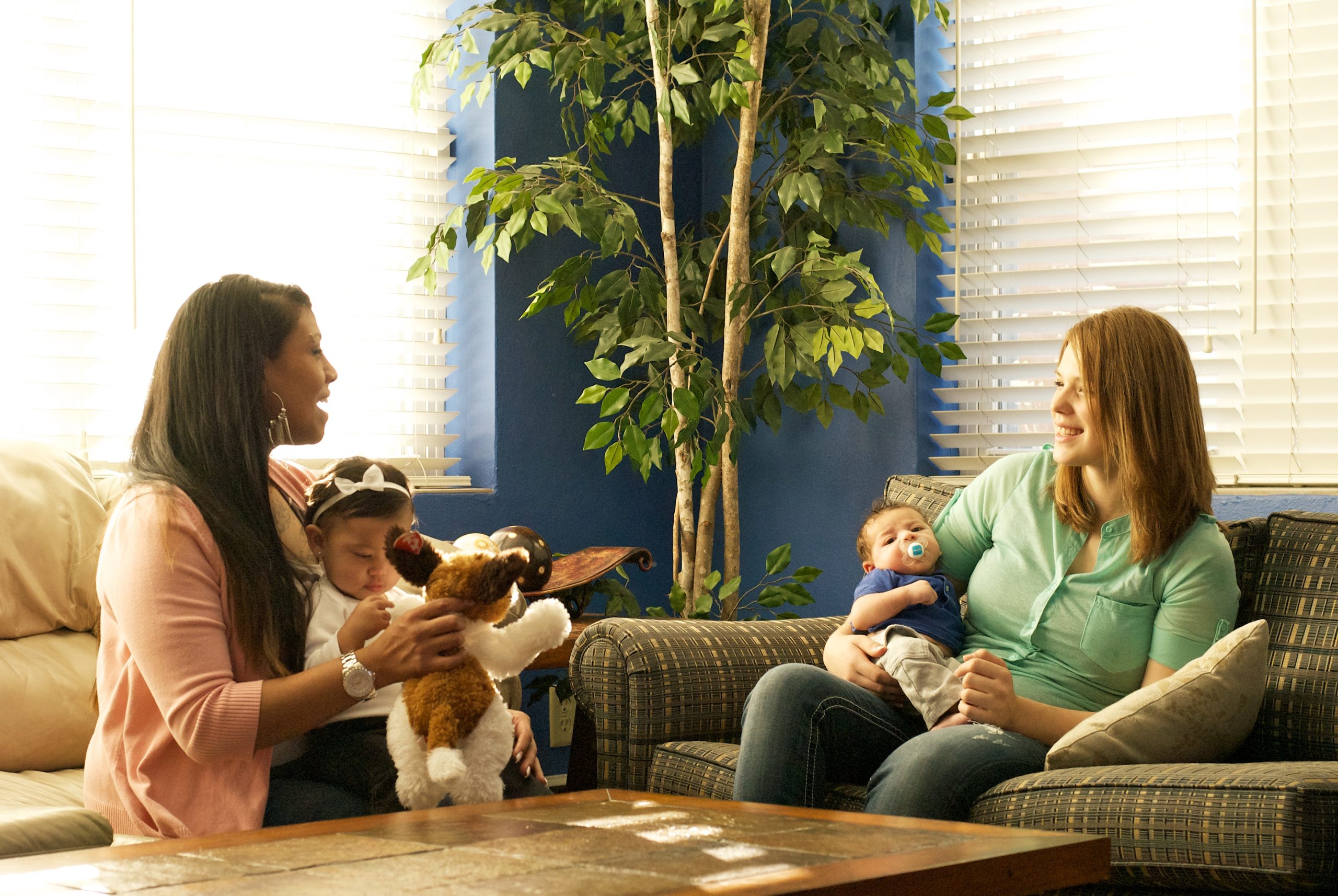
Two mothers and their babies share some down time together at Bethlehem House. COURTESY PHOTO
News
Well beyond pregnancy, Bethlehem House helps women in crisis
June 24, 2022
“Reneé” is a fictitious name for a real person whose life has been transformed because of help she received from Bethlehem House, a maternity home in Omaha. The woman asked to remain anonymous because of safety concerns, but she wanted her story shared so others in a crisis pregnancy situation might be helped.
Reneé knows what it’s like to be an addict, inmate, homeless shelter resident and relapsed addict.
She was recovering from that life when she became pregnant four years ago.
“I was so scared,” she said, when she learned of her pregnancy.
She’d had her three older children taken away from her and placed in foster care when she went to prison, and she didn’t want that to happen again.
“I wanted to make sure I could stay sober, Reneé said. “My worst fear was losing my child and enduring that pain again.”
A woman from her Protestant church recommended Bethlehem House, a maternity home in Omaha that helps women like Reneé turn their lives around.
Almost four years after giving birth to a son, the 38-year-old is still sober, has a college certificate in management and human resources and has reconnected with the father of her son and is going through therapy with him.
She said she’s grown in her Christian faith and is beginning to re-establish some ties with the three sons she had to relinquish and who have since been adopted.
“I was lost in the world,” Reneé said. “Bethlehem House helped me find stability – mentally, physically, spiritually.”
Many women like Reneé have found help and hope at Bethlehem House. Typically they grew up in unstable homes, have been incarcerated, homeless or suffered from violent relationships, said TJ Ernst, executive director at the maternity home.
“We’re serving women who need a place to live and need a place to just get back on their feet, to refocus on themselves and their lives,” Ernst said.
“Perhaps they bounced around in the foster system or they aged out of the foster system,” he said of the residents. “They become adults without being able to truly function as we know adults should.”
Bethlehem House offers them a core curriculum of faith formation, healthy parenting, financial literacy, sexual integrity, and health and wellness, he said.
SUPPORT AND GUIDANCE
Residents typically stay eight to 12 months at the house, a former convent building on what used to be the grounds of St. Patrick Parish at 15th and Martha streets. The building can house 12 women at a time.
The parish sold the building to Bethlehem House for $1 in 2005. Since its founding, the home has cared for and nurtured women, based on Catholic principles, Ernst said.
Bethlehem House offers women numerous services, including support for overcoming addictions or physical or mental abuse, help with obtaining employment or an education, and classes on money management and parenting.
Staff are available for the residents 24/7. Once they’ve left the home, aftercare is available for as long as needed to help keep graduates on track.
Women served by Bethlehem House are typically between the ages of 27 and 34 and have given birth to other children, Ernst said. Often those children are in foster care, he said.
Rooms at the maternity home are too small to accommodate families, but that helps the women stay focused on themselves, he said. Once the residents have their babies, however, the babies stay with their mothers at the house until they are ready to leave.
Bethlehem House aims to build up the residents as the women and mothers “that God wants them to be,” said Ernst, a member of St. Vincent de Paul Parish in Omaha.
“It’s a loving environment” at Bethlehem House, he said. “It’s a supportive environment.”
“We don’t tell the women what they need,” because every woman’s circumstances and needs are unique, he said. “They tell us what they need, and we try to accommodate them as best as possible.”
“We do not require our women to adhere to a faith,” Ernst said. “We give them the opportunity to do so. We provide Mass here on a regular basis. There is a chapel here. We also have a weekend coordinator who will take women to any church that they want to go to.”
A Muslim resident, for example, has been going to an Omaha mosque, he said.
RESIDENTS WORK, PARTICIPATE
All residents qualify for government-subsidized Medicaid, and staff members help them obtain that health care coverage or other available insurance. Staff also help the women obtain driver’s licenses, birth certificates, Social Security cards and other important documents.
“When you’re homeless and living under a bridge, or you’re couch surfing with friends and family, you don’t have that stuck in a file somewhere,” Ernst said. “You don’t have a wallet in your back pocket that you’re keeping all that stuff in. That’s the least of your worries. You’re just trying to figure out where your next meal is coming from.”
The mothers are often referred to Bethlehem House from the justice system or homeless shelters. The women apply to the home and have a two-hour conversation with a staff member to determine their circumstances and to see if they would fit in at the home, Ernst said.
“When you live here you’re not just sitting up in your room,” he said. “You’re participating in classes,” doing chores and eating meals together. “We really want them to participate and take advantage of what we are offering them. … They have to work for what we are willing to provide for them.”

Residents at Bethlehem House in Omaha pitch in with chores and eat meals together. COURTESY PHOTO
“When they get here, they get all the stuff they need to continue the process forward,” the executive director said.
If staff members help a woman get a job, they’ll also help secure a vehicle for her, along with the necessary driver’s license, birth certificate and Social Security card. If a woman hasn’t finished high school, they’ll help her earn a high school equivalency diploma. If a woman already has a high school diploma, they’ll encourage her to take college classes.
Everything offered by Bethlehem House is free of charge, including tuition. Once they leave, Bethlehem House continues to help them, giving scholarships to help the mothers pay for their education.
“There would be a plan in place,” Ernst said. “They have a little skin in the game, but we don’t want to set them up for failure.”
The maternity home is community funded, through grants and donations of money, food, clothing, furniture and household items. A thrift store called Humble Lily, at 12100 West Center Road in Omaha, is part of Bethlehem House, with proceeds going to the maternity home.
‘YOU NAME IT – WE WILL PROVIDE’
Bethlehem House offers its aftercare to graduates of its programs. They can come back years down the road and participate in offerings such as parenting classes that focus on toddlers or that help them maintain sobriety.
“It’s really an extension of our services here,” Ernst said. “If women need continued therapy or addiction and recovery services – you name it – we will provide it for them free of cost. We just want them to stay connected, stay engaged. We want to provide case management for them, so they’re usually meeting regularly with our aftercare case manager.”
“We do regular drug testing for not only the women in the house, but also for the women in aftercare,” he said. “It’s OK if they fail a drug test. We just set up a plan to get them back on track. We know that’s going to happen. We just don’t want small problems to become big problems. We want to catch that early and keep them on a path to success.
“We know that working with them for a lifetime, there’s always going to be ups and downs. So we want to make sure that we catch them when they fall and really celebrate when they succeed.”
Bethlehem House is solidly pro-life and never refers or coaches women toward abortion. “But we understand that that might be a choice that they take,” Ernst said, “and we will do absolutely everything we can to encourage them to keep their babies. Most women who come to us have pretty much gotten past that decision process.”
The maternity home is a “boots on the ground” response to abortion, he said. “We are here to take care of that woman and her child. … Not just being a small blip on the radar, we want to be there for life.
“We want to continue to serve them for as long as they want,” Ernst said of the residents. “They can be with us forever” through the aftercare program.
A HOME NEXT DOOR
Government-subsidized apartments for single mothers were recently constructed next door to Bethlehem House, with former residents of the home in mind. Graduates who met income guidelines have moved in, including Reneé, who’s advanced step by step from the job she had at a fast-food restaurant when she was a Bethlehem House resident to her current job at a nonprofit organization.
Homelessness is the biggest issue for the women who turn to Bethlehem House, Ernst said. “Once women have a home, a place to call home, they feel safe, they have their possessions around them, it just brings about everything else. It’s easier to cook for yourself. It’s easier to live a healthy lifestyle. It’s easier to break addictions and try to recover. … Providing a home just helps with so many of the other issues that these women face.”
Bethlehem House also partners with another property developer, Seldin Company, which offers government-subsidized housing for low-income residents. That partnership helps graduates find housing in the Omaha metropolitan area, even if their income is $14 an hour.
If a woman would lose her job, Bethlehem House would help her find another and enable her keep her apartment, Ernst said. Seldin has been understanding and is “willing to work with our women and really prevent them from becoming homeless again. That’s the last thing we want them to do.”
Before finding Bethlehem House, Reneé said, she had moved from place to place her entire life.
The organization’s financial literacy class helped her restore her credit. Staff helped her find a pediatrician for her son and connected her with Chariots4Hope, a nonprofit organization that gave her a car.
She hadn’t owned a vehicle for nine years. Transportation is vital, she said, especially for a parent.
From her apartment next to Bethlehem House, Reneé has easy access to aftercare classes, which are held in a community room in her building.
Bethlehem House also connected her with a therapist, who’s helping her and the father of her son with co-parenting and family therapy.
“My journey has been long,” Reneé said. Bethlehem House has eased that transition by allowing her to focus on herself and encouraging her to build her relationship with Christ.
“I learned to be a better mom and a better me,” she said. “God placed the Bethlehem House in my life when I was scared. What was taken from me by the devil, he (God) gave me three times more.”
She said she’s working on her relationship with her three older sons – now ages 12, 15 and 16 – and being able to re-enter their lives.
That reunion will happen, she said, “in God’s time.”
The support she’s received from Bethlehem House has been “overwhelmingly wonderful,” Reneé said. The staff at Bethlehem House “encouraged me to seek my dreams and go after them.”